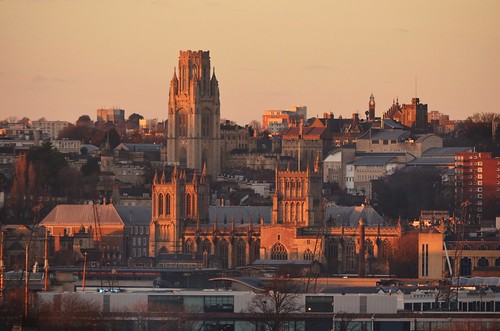So, on this day, 424 years ago, Alleyn wrote to Joan from Bristol, a large port city in southwestern England.The letter was carried to London by a relative of one of the actors in the company, and along with it, Alleyn sent his white waistcoat, explaining, "it is a trouble to me to carry it", and asking Joan to "lay it up for me till I come". As in his previous letter to her, Alleyn calls Joan his "good sweet mouse".

Fears of the plague
When writing to Joan back in May, shortly after the tour had begun, Alleyn had made light of his absence, but this time he expresses directly his fears about the plague that was gripping London. He tells Joan he hopes that although "the sickness be round about you yet by [God's] mercy it may escape your house". He advises her to "keep your house fair and clean, which I know you will and every evening throw water before your door and in your backside [I assume he means back yard...] and have in your windows good store of rue and herb of grace"; he feels that this, along with praying, will protect her. As Carol Chillington Rutter observes, these preventative methods may seem unconvincing today, but Alleyn is at least recommending cleanliness, which was the best solution available in an age when the causes of the plague were unknown.
Touring
Alleyn gives us a glimpse of the company's future touring plans when he tells Joan "if you send any more letters, send to me by the carriers of Shrewsbury or to Westchester [an old name for Chester] or to York, to be kept till my Lord Strange's Players come". It looks as though they were planning a great sweep through the North of England, but although there is indeed a record of them reaching Shrewsbury, we do not know if they continued with their plan.
Alleyn signs off by saying that he is in "Bristol, this Wednesday after St James's Day, being ready to begin the play of Harry of Cornwall". In their book on Lord Strange's Men, Lawrence Manley and Sally-Beth Maclean observe that St James's Day was 25 July and that Bristol held an annual 9-day St James's Fair around that date; the company was presumably there in the hopes of large audiences. Since Bristol is in the west country, perhaps Harry of Cornwall was chosen for its local colour?
Homesickness and thoughts of return
Alleyn then adds a rather sad postscript, which suggests intense homesickness (understandable after months of touring): "Mouse, you send me no news of anything. You should send of your domestical matters: such things as happens at home, as how your distilled water proves, or this or that, or anything. What you will."
But Alleyn hasn't finished. Running out of space, he writes in the left-hand margin,
And Jug, I pray you, let my orange-tawny stockings of woolen be dyed a very good black against I come home to wear in the winter. You sent me not word of my garden, but next time you will, but remember this in any case: that all that bed which was parsley in the month of September you sow it with spinach, for then is the time. I would do it myself, but we shall not come home till Allhallowtide. And so, sweet mouse, farewell, and brook our long journey with patience.Allhallowtide was the 3-day holiday period that began on October 31 (now Hallowe'en). Alleyn was thus expecting to remain on the road at least another two months.

What's next?
A follow-up letter from Henslowe will be described in a post to appear next week.
Further reading
- Facsimile of the letter, from the Henslowe-Alleyn Digitisation Project. (Unless I'm missing something, they're in error when they date it 24th July).
- Carol Chillington Rutter, Documents of the Rose Playhouse (Manchester University Press, 1984), 73-5.
- Lawrence Manley and Sally-Beth MacLean, Lord Strange's Men and their Plays (Yale University Press, 2014)
No comments:
Post a Comment